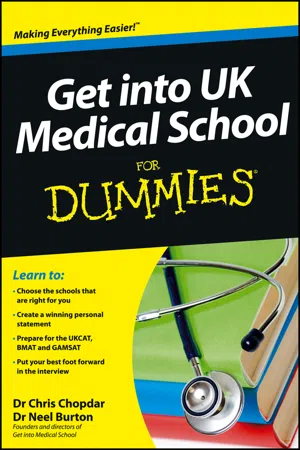Part I
Targeting Medical School
In this part…
Part I is about getting to grips with the challenge of applying to medical school. The application process seems long and tiresome but breaking it down into smaller chunks makes it much easier to digest.
Your first step is making a positive choice to become a doctor. Then you need to choose some medical schools, successfully complete your application and meet the academic requirements. On top of all this, you need to get the right sort of work experience to complement your extracurricular activities in demonstrating your commitment and aptitude for medicine.
The chapters in this part cover each of these steps in turn, culminating in a chapter on how to write your application to present yourself in the best possible light.
Chapter 1
Deciding whether to Study Medicine
In This Chapter
Understanding the pros and cons of a career in medicine
Discovering whether you have the necessary qualities
Introducing the UK’s medical schools
Medicine is unique. Life as a doctor is intensely rewarding and satisfying. At times, it’s demanding and stressful. Applying to, and studying at medical school parallels these highs and lows. It’s the start of a great adventure.
When thinking about a career as a doctor, you need to ask yourself whether you have what it takes to get into medical school and, perhaps even more importantly, whether you possess the necessary qualities to be a great doctor. In this chapter, we give you the information you need to answer these two crucial questions. We also introduce you to the system of UK medical schools and training, and onto starting your career as a doctor.
Working as a Doctor
Medicine is one of the most privileged professions to follow – as well as one of the most challenging. Applying to medical school is a serious decision. To be a good candidate, you need to understand the rewards and risks of being a doctor and make a balanced, mature decision that devoting yourself to a medical career is what you really want from life.
To help, we go through the positive and negative aspects of modern medicine, with a focus on UK practice, so you appreciate what you’re getting yourself into.
Knowing the benefits
Medicine has a lot going for it as a career. It’s enjoyable and the skills you learn are invaluable and highly transferable. In this section, we present some of the many upsides.
Enjoying the variety
Although some basic scheduling is involved – such as fitting professional activities around outpatient clinics and perhaps managing ward patients in hospital – one of the best aspects is the sheer variety and excitement of everyday life as a doctor. The people you see and what you do on any given day vary enormously and you meet an entire cross-section of humanity. That unpredictability is challenging but fun, and lends a certain buzz to a day’s work.
You get to adapt to different situations, too, and the very act of helping other people can be highly rewarding. Dr Cox, the acerbic physician on TV’s Scrubs, jokes that ‘all doctors are praise addicts’ and a kernel of truth lurks in that statement. Mind you, we’d rephrase it to say that ‘doctors enjoy doing a task well, and few tasks are more worthy than being able to help when no one else can’.
Not as punchy a line, admittedly!
Relishing plenty of career options
As with many professional jobs, doctors are responsible for keeping their skills up to date and checking that their practice meets the best standards, as well as investigating and deciding upon the best way to do things. These educational, developmental, management and research or audit roles form part of a doctor’s week and many medics enjoy these activities. Some doctors enjoy them so much that they form the bulk of their working lives. For example, academically-focused doctors work as university lecturers and researchers. Other doctors choose to work in the private sector, perhaps as a clinician or doing research and liaison work with pharmaceutical companies. Others still opt to work for charities, in their home country or internationally.
Some medics work on hospital management boards and in conjunction with the Department of Health or other political and lobbying organisations. A few doctors even run for elected office!
A career in medicine offers such a wide variety of potential roles that you’re almost certain to identify a niche you love. Of course, getting that ideal job can be difficult but the opportunities certainly exist.
Recognising other benefits
Although doctors don’t like to talk about them much, other slightly more selfish plus points apply to being a doctor. But they’re an important part of people’s lives, and so we need to talk about them openly and honestly:
Money: Sadly, very few doctors end up fabulously wealthy. If you want bags of money, medicine isn’t the right career for you; may we suggest hedge-fund management instead? Howe...




